Hotel Night Auditor: Responsibilities, Skills, Salary & Career Path
Oct 18, 2025
 Mika Takahashi
Mika TakahashiPopular Categories
Hotel Technology & InnovationHotel Operations OptimizationDigital MarketingIndustry TrendsRevenue ManagementHospitality Industry
Popular Categories
Trending Post

Hotel Walk Letter Template: Professional Guest Communication
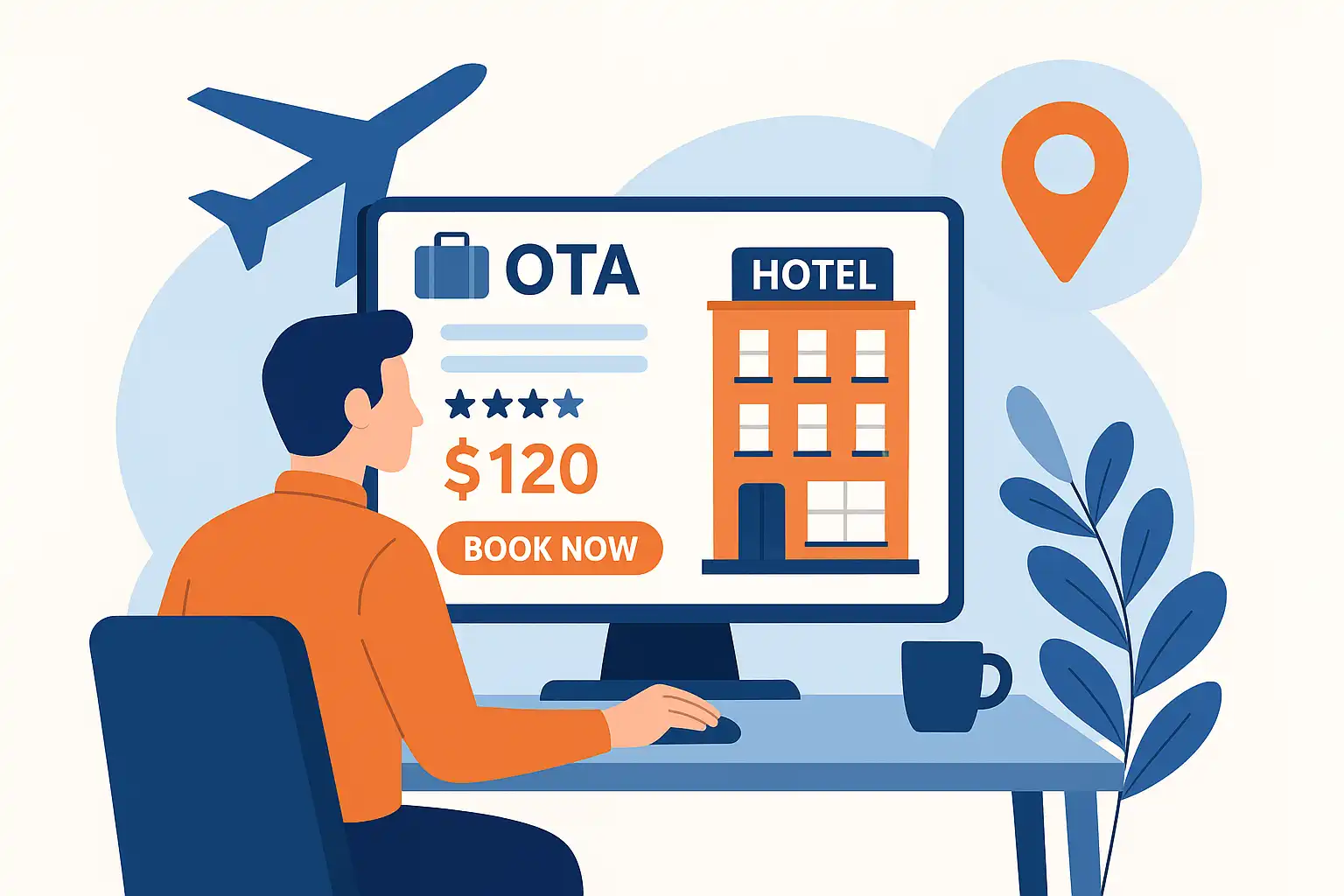
Online Travel Agents: What They Are and How They Work
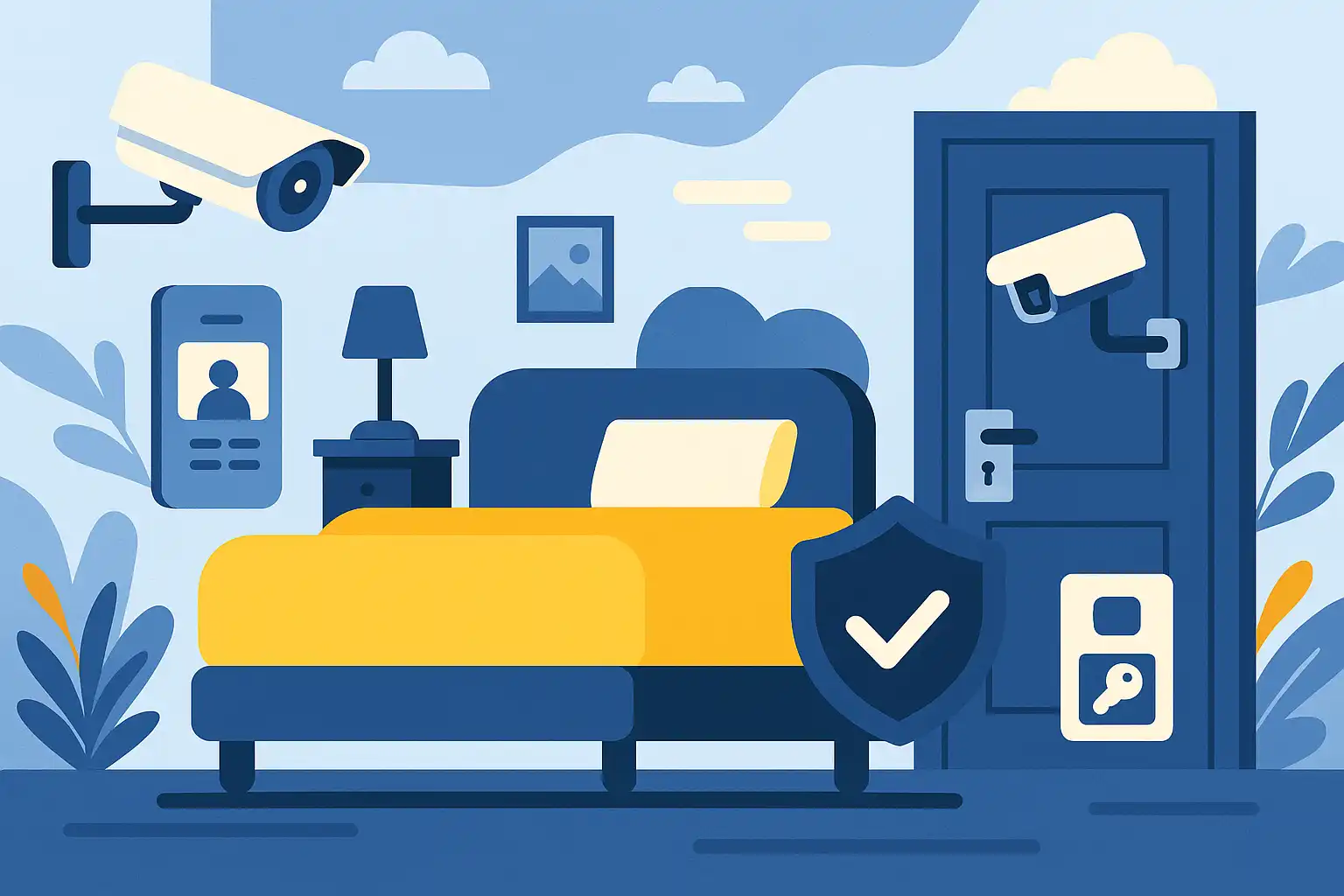
Hotel Security Systems: Modern Protection Solutions

Hotel Advertising: Complete Guide to Boost Bookings and Revenue
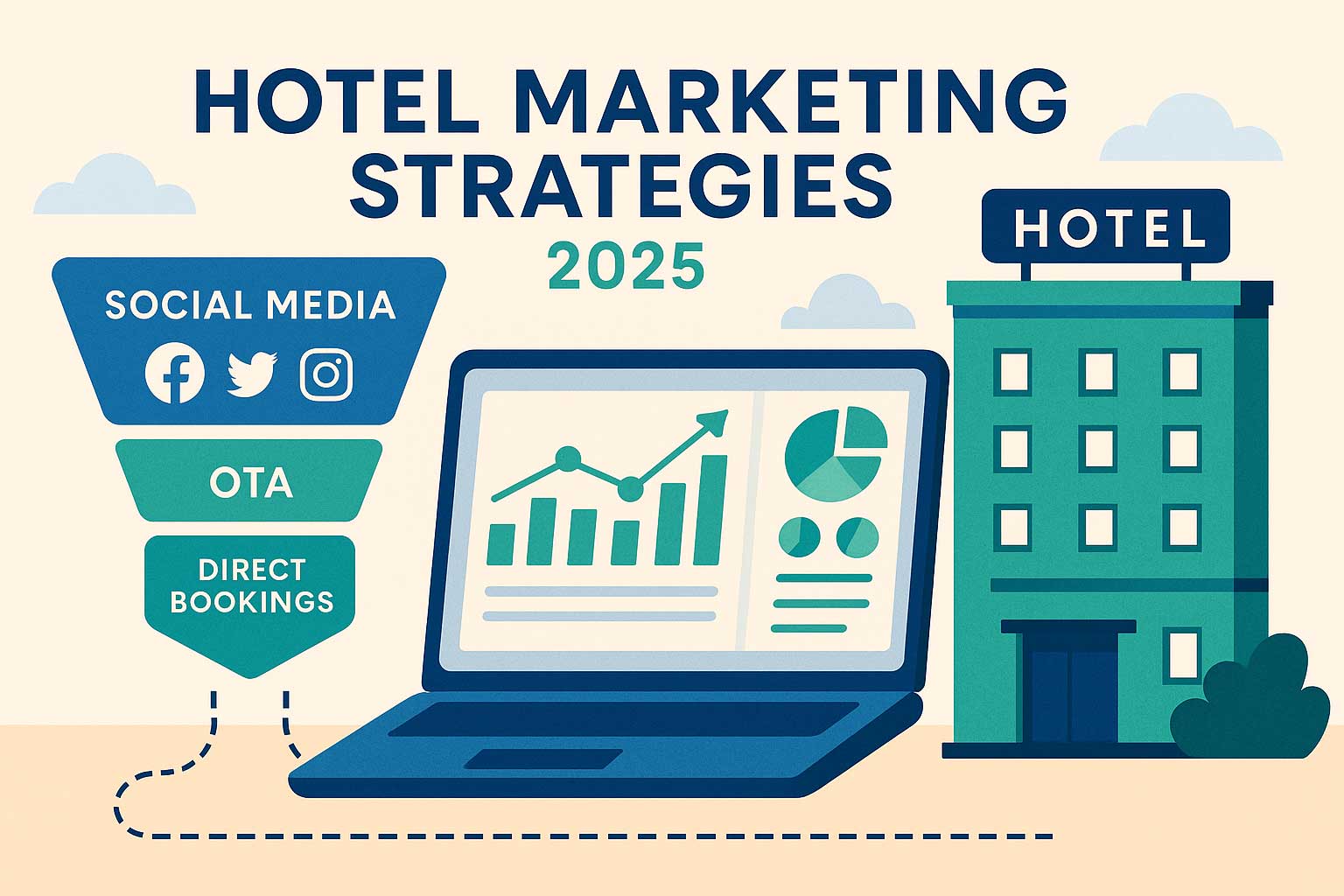
25 Hotel Marketing Strategy Ideas for 2025: Complete Guide

AI Reservation Agent: Revolutionizing Hotel Booking and Guest Experience

PMS Communication: Streamlining Property Management Through Effective Guest Messaging
Table of contents
While most people are fast asleep, hotel night auditors are the unsung heroes keeping the hospitality industry running smoothly around the clock. These dedicated professionals blend excellent customer service with sharp financial oversight during the quiet hours when most hotel guests are tucked away in their rooms.
The role of a hotel night auditor offers a unique and rewarding opportunity in the hospitality industry. It’s the perfect fit for those who enjoy a mix of guest interaction, financial responsibilities, and operational management. Whether you’re thinking about a career change or just starting out in hotel management, getting to know this position could open the door to an exciting path in hospitality.
In this guide, we’ll walk you through everything you need to know about becoming a hotel night auditor — from daily duties and essential skills to salary expectations and career growth opportunities.
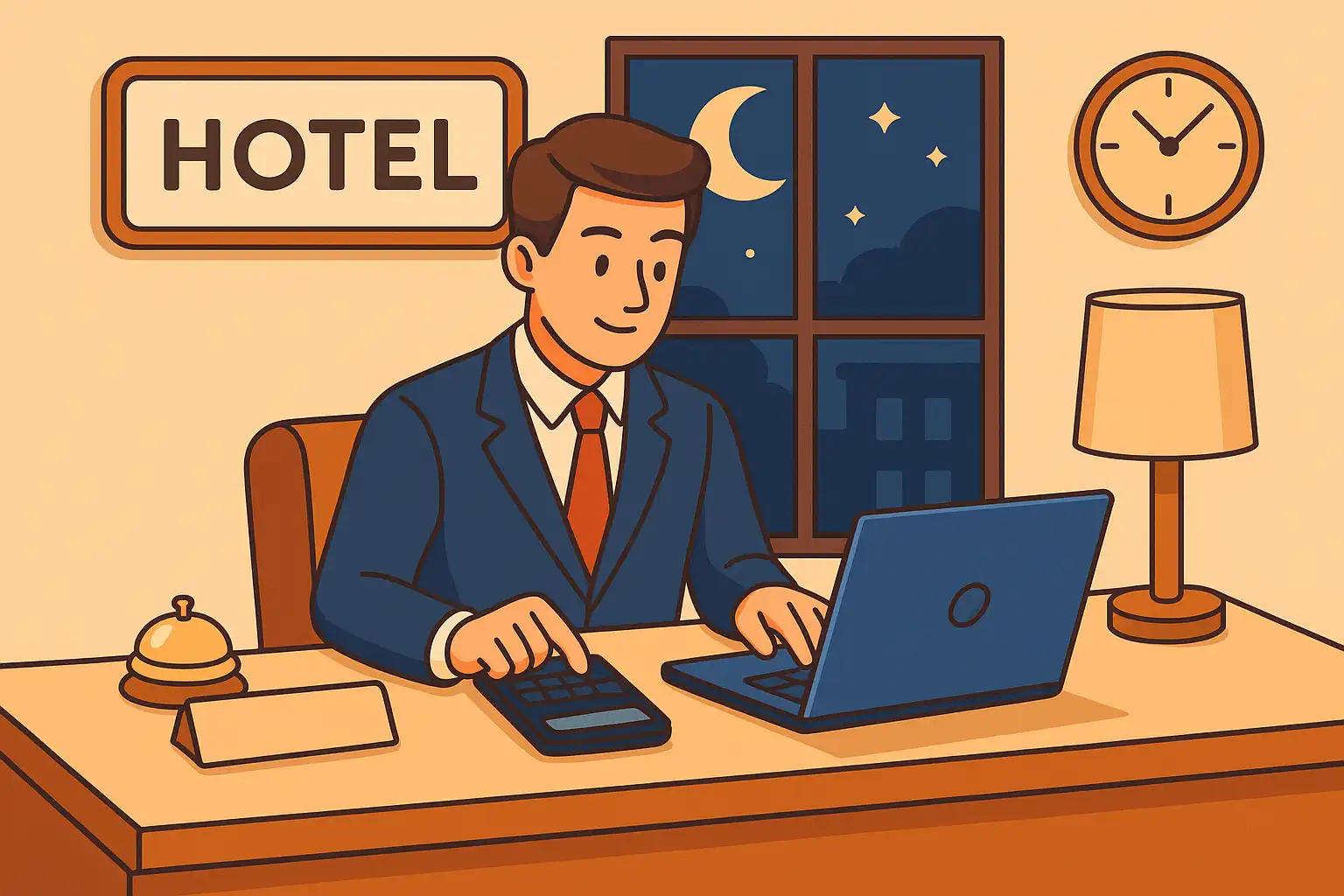
What is a Hotel Night Auditor?
A hotel night auditor is a hospitality professional who combines front desk staff duties with financial auditing during the overnight shift, usually from 11 PM to 7 AM. This hybrid role acts as a vital link between daily office operations and the next day’s preparations, ensuring everything runs smoothly and guests receive the high level of service they expect.
But the night auditor job goes far beyond just handling the front desk. They often step in as overnight managers, taking care of guest services, monitoring hotel security, and responding to emergencies when other hotel staff have clocked out. They process late check-ins, reconcile accounts, and prepare detailed financial reports that hotel management and the revenue manager rely on to make informed decisions.
Unlike day shift desk agents, hotel night auditors need a unique blend of people skills and analytical abilities. They provide excellent customer service during the early hours while carefully reconciling accounts and ensuring every hotel transaction and room charge is accurate.
They also coordinate with housekeeping to update room status, work with maintenance on urgent repairs, and prepare handover reports for the morning shift. This teamwork across various departments keeps hotel operations seamless and guests happy.
Core Job Responsibilities and Daily Duties
The hotel night auditor’s job is multifaceted, covering guest services, accounting duties, and operational management. During an 8-hour overnight shift, typically from 11 PM to 7 AM, they juggle a variety of tasks that keep the hotel running efficiently and guests satisfied.
Hotel night auditors work closely with housekeeping, maintenance, and security personnel throughout their shift. They’re the go-to person for any overnight issues — from guest inquiries and complaints to emergency situations that need immediate attention. Staying organized and prioritizing tasks is key, especially when things get busy.
One of the most important parts of the job is the handover to the day shift. Hotel night auditors prepare detailed reports covering overnight activities, resolved guest issues, maintenance requests, and any financial discrepancies found during the night audit process. This ensures the front desk staff and hotel management start their day fully informed.
Front Desk Operations and Guest Services
Handling late-night check-ins and early morning check-outs makes up a big part of the night auditor’s guest-facing duties. Overnight arrivals often include travelers dealing with delayed flights or long journeys, so hotel night auditors offer extra patience and assistance with luggage, directions, and hotel amenities.
They also manage guest inquiries, complaints, and special requests with exceptional customer service skills and creative problem-solving. Whether it’s dealing with noise complaints, helping guests locked out of their rooms, or arranging extra bedding, night auditors are there to make sure guests feel cared for.
Managing room key access and room assignments is another important responsibility. Night auditors coordinate with housekeeping to ensure rooms are ready and update the property management system to reflect any changes accurately.
Providing hotel concierge services like local dining recommendations, directions to nearby pharmacies, or arranging early morning transportation shows just how comprehensive the role is. Many guests rely on night auditors for these late-night or early-morning needs.
Operating phone systems and managing reservations requires multitasking and familiarity with various software platforms. Hotel night auditors handle reservation changes, cancellations, and keep availability and pricing information up to date.
Financial Auditing and Accounting Tasks
At the heart of the hotel night auditor job is reconciling accounts and reviewing guest folios. This means carefully checking every transaction from the past 24 hours to ensure charges, payments, and credits are all accurate.
Balancing cash drawers and processing credit card payments demands attention to detail and strong analytical skills. Hotel night auditors make sure physical cash matches system records and handle final payments from guests checking out.
Posting room charges, taxes, and incidental fees correctly requires a good understanding of billing systems and local tax rules. Night auditors verify that everything is categorized properly to avoid billing disputes and ensure correct revenue reporting.
Generating night audit reports and revenue summaries gives hotel management the financial insights they need for daily planning. These reports include occupancy rates, revenue breakdowns by department, and highlight any unusual transactions.
When discrepancies arise, night auditors investigate and resolve them, tracing missing charges or correcting errors. Keeping detailed documentation helps maintain financial integrity and prevents revenue loss.
Security and Safety Monitoring
Hotel night auditors also play a key role in hotel security. They monitor surveillance cameras and alarm systems to keep guests safe and protect hotel property during the overnight hours.
In smaller hotels, night auditors often conduct security rounds of public areas and parking lots, identifying maintenance issues or security risks. This hands-on approach helps maintain a safe environment.
They manage access control systems and keycard programming, assisting guests with key issues and keeping accurate records for security purposes.
When emergencies happen, night auditors respond calmly and coordinate with emergency services as needed. They are the primary contact for incidents like medical emergencies or fire alarms during the night.
Keeping incident reports and safety documentation up to date supports insurance requirements and helps identify patterns that may need management’s attention.
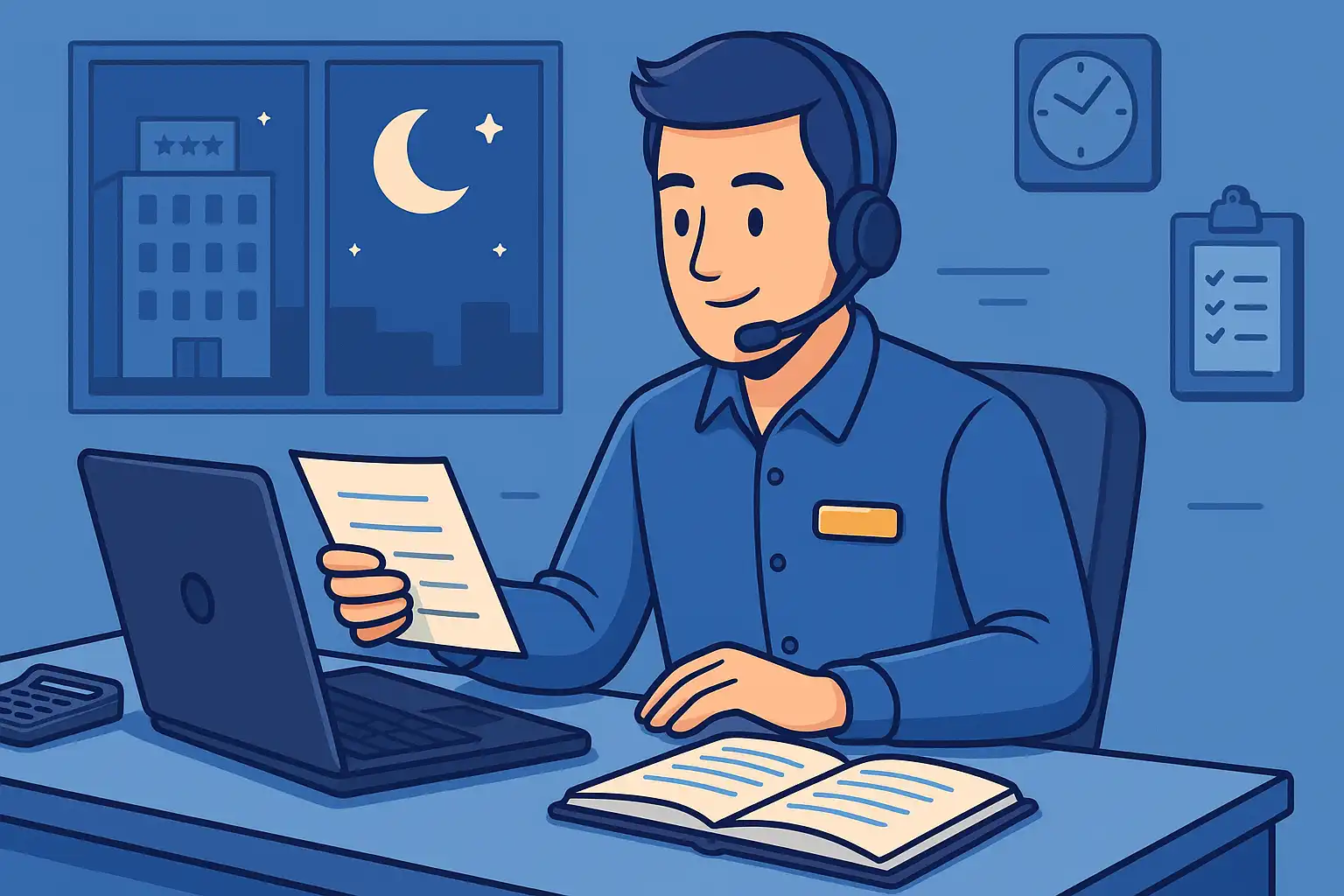
Required Skills and Qualifications
Being a successful hotel night auditor means having the right mix of education, technical skills, and personal qualities. Most positions require at least a high school diploma, but experience in hospitality or accounting is a big plus.
Technical know-how is essential, especially with property management systems and financial software becoming more advanced. Hotel night auditors need to quickly learn and navigate complex platforms.
Strong communication, problem-solving, and attention to detail make all the difference. The role demands excellent customer service skills combined with the ability to handle financial tasks accurately.
Working overnight requires stamina and the ability to stay alert and focused while often working independently.
Essential Technical Competencies
Proficiency with Property Management Systems like Prostay, Opera, or Maestro is fundamental. These systems manage everything from reservations and guest check-ins to financial reporting and housekeeping coordination.
A solid understanding of accounting principles and financial reconciliation helps night auditors grasp the bigger picture and spot potential issues.
Computer literacy, including Microsoft Office and hotel-specific software, supports reporting and documentation.
Knowing how credit card processing works ensures smooth handling of guest payments and reduces disputes.
Critical Soft Skills
Clear verbal and written communication skills help hotel night auditors provide excellent customer service and keep management informed.
De-escalation techniques are vital for handling difficult guests or emergencies calmly and professionally.
Being able to multitask and manage time effectively keeps all responsibilities on track through the night.
Cultural sensitivity and language skills improve interactions with international guests, enhancing their experience.
Salary and Compensation Information
Hotel night auditors earn competitive pay that reflects their specialized skills and overnight work. In the U.S., salaries typically range from $27,500 to $45,000 annually, varying by location, hotel type, and experience.
Recent data shows the median wage for hotel desk clerks, including night auditors, was about $29,120 in 2023. Experienced auditors in big cities or luxury hotels can earn upwards of $50,000, especially with bonuses and shift differentials.
Around the world, salaries differ. In the UK, night auditors usually make between £20,000 and £30,000 annually, while in France, it’s €25,000 to €35,000. In Dubai, pay ranges from AED 50,000 to 80,000, reflecting its booming hospitality sector.
Additional perks like shift differentials, benefits, and bonuses can boost overall compensation. Many hotels offer extra pay for overnight shifts recognizing the unique challenges they bring.
| Location | Entry Level | Experienced | Top Performers |
|---|---|---|---|
| Small Town USA | $27,500 | $35,000 | $42,000 |
| Major US City | $32,000 | $42,000 | $52,000 |
| Luxury Resort | $35,000 | $45,000 | $55,000 |
| International (Dubai) | $40,000 | $50,000 | $65,000 |
Working Hours and Shift Details
Hotel night auditors typically work an overnight shift from 11 PM to 7 AM, covering the hotel’s quietest hours while preparing for the busy day ahead.
Working weekends and holidays is part of the job since hotels operate 24/7 and guest needs never stop.
Schedules can vary, especially in larger hotels with multiple night auditors, while smaller properties may require longer or consecutive night shifts.
Balancing work and life with overnight hours takes planning. Successful night auditors develop routines to maintain good sleep, stay connected with family, and keep their well-being in check.
Tips include sticking to consistent sleep schedules, using blackout curtains, and maintaining regular exercise and healthy eating habits.
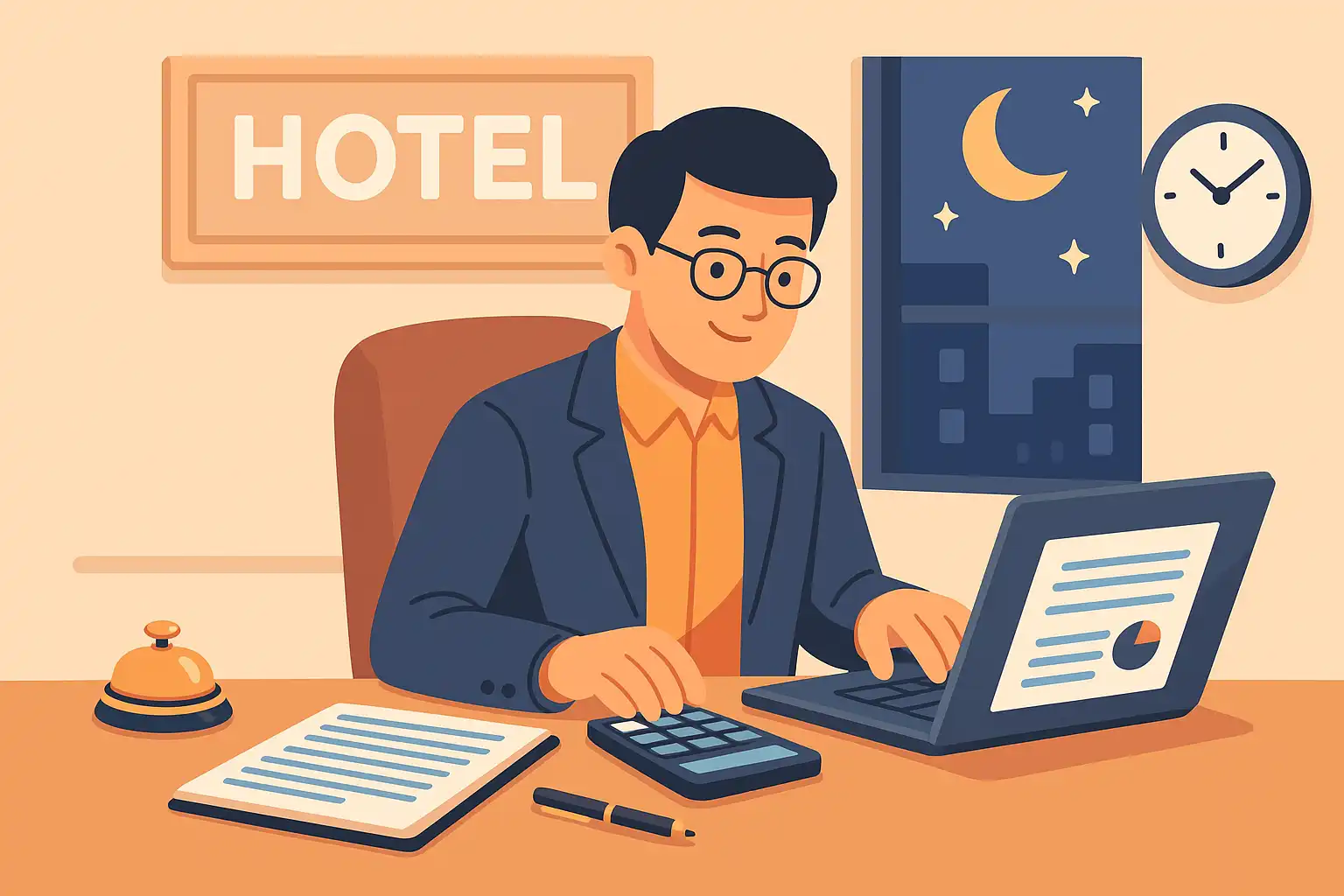
Technology and Tools Used
Modern Property Management Systems have transformed hotel night auditing by automating many routine tasks. This allows night auditors to focus more on guest service and handling exceptions.
Cloud-based systems keep data synchronized in real-time, giving night auditors instant access to housekeeping updates, maintenance requests, and guest preferences.
Mobile check-in technology lets guests bypass the front desk for simple tasks, but night auditors remain essential for complex situations and personalized service.
Security monitoring and emergency communication tools provide comprehensive oversight and quick access to help when needed.
Financial software streamlines bookkeeping, payroll, and reporting, ensuring accuracy and providing management with detailed insights.
Training and Professional Development
Most hotel night auditors receive on-the-job training covering hotel procedures, emergency protocols, and system use. Experienced auditors often mentor new hires to help them adjust to overnight operations.
Certification programs in hospitality management add valuable credentials and boost career prospects.
Ongoing training in customer service, accounting, and safety keeps night auditors up to date with industry best practices.
Cross-training in other hotel departments broadens skills and opens doors for advancement.
Career Advancement Opportunities
Successful night auditors often move up to front office manager, assistant general manager, or operations manager roles, gaining leadership responsibilities.
Experience in night auditing also prepares professionals for positions in revenue management, accounting, or hotel administration.
Skills developed in this role transfer well to other hospitality sectors and even outside industries like corporate finance or retail management.
Networking and joining hotel industry associations can support career growth through connections and learning opportunities.
Many hotel managers credit their start as night auditors for giving them a solid foundation in hotel operations and guest satisfaction.
Interview Process and Hiring Considerations
Interviewers look for candidates who understand the unique challenges of night shifts and can handle guest service and financial accuracy under pressure.
Common questions focus on overnight availability, handling difficult guests, financial reconciliation experience, and maintaining alertness.
Employers also assess motivation for night work and long-term career goals to find committed candidates.
Background checks and security clearances are standard due to the trust and responsibilities involved.
References from previous hospitality roles help verify work ethic and interpersonal skills.
Sample interview questions include:
- Why are you interested in working night shifts?
- How would you handle an angry guest at 2 AM when management isn’t available?
- Describe your experience with financial reconciliation or cash handling.
- What would you do if you discovered a significant discrepancy in the night audit?
- How do you plan to maintain alertness during overnight hours?
Strong candidates show enthusiasm for hospitality, excellent communication, attention to detail, and a realistic understanding of night shift demands.
Conclusion
The hotel night auditor role offers a unique entry point into the hospitality industry, combining essential front desk operations with valuable financial experience that builds a solid foundation for career growth. It’s a perfect fit for those who thrive working independently, enjoy problem-solving, and want to develop broad skills in customer service and hotel operations.
With competitive salaries, ongoing professional development, and clear paths to management, night auditing is an excellent career choice for those ready to embrace the challenges and rewards of overnight work. The growing hospitality industry continues to create opportunities for skilled night auditors who deliver exceptional customer service and keep accurate financial records.
Whether you’re a night owl seeking a fulfilling career or a hospitality professional looking to expand your skill set, the hotel night auditor role offers valuable experience and opens doors throughout the industry. Start your journey by exploring local opportunities, honing your customer service skills, and preparing for success in this vital hospitality position.
